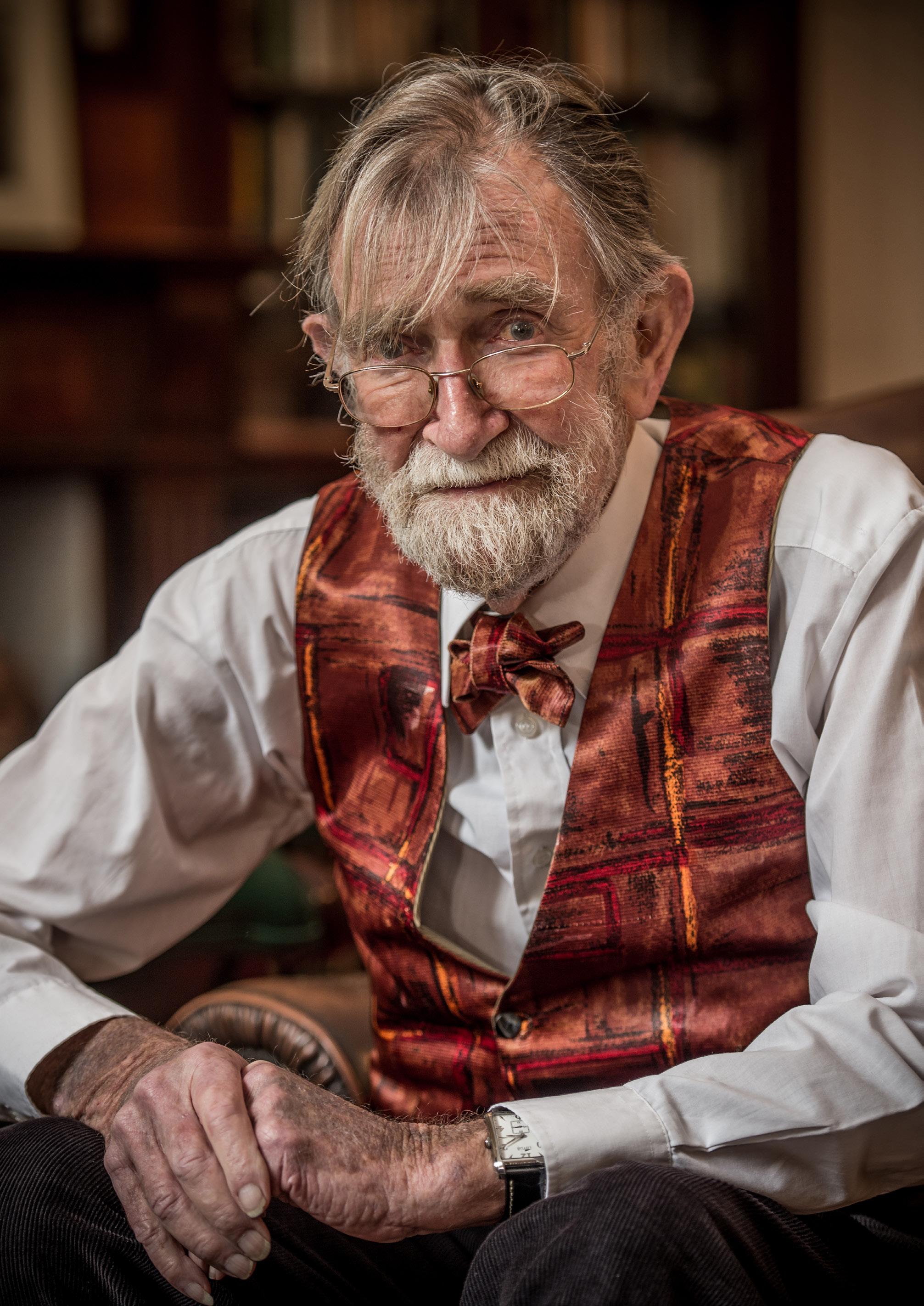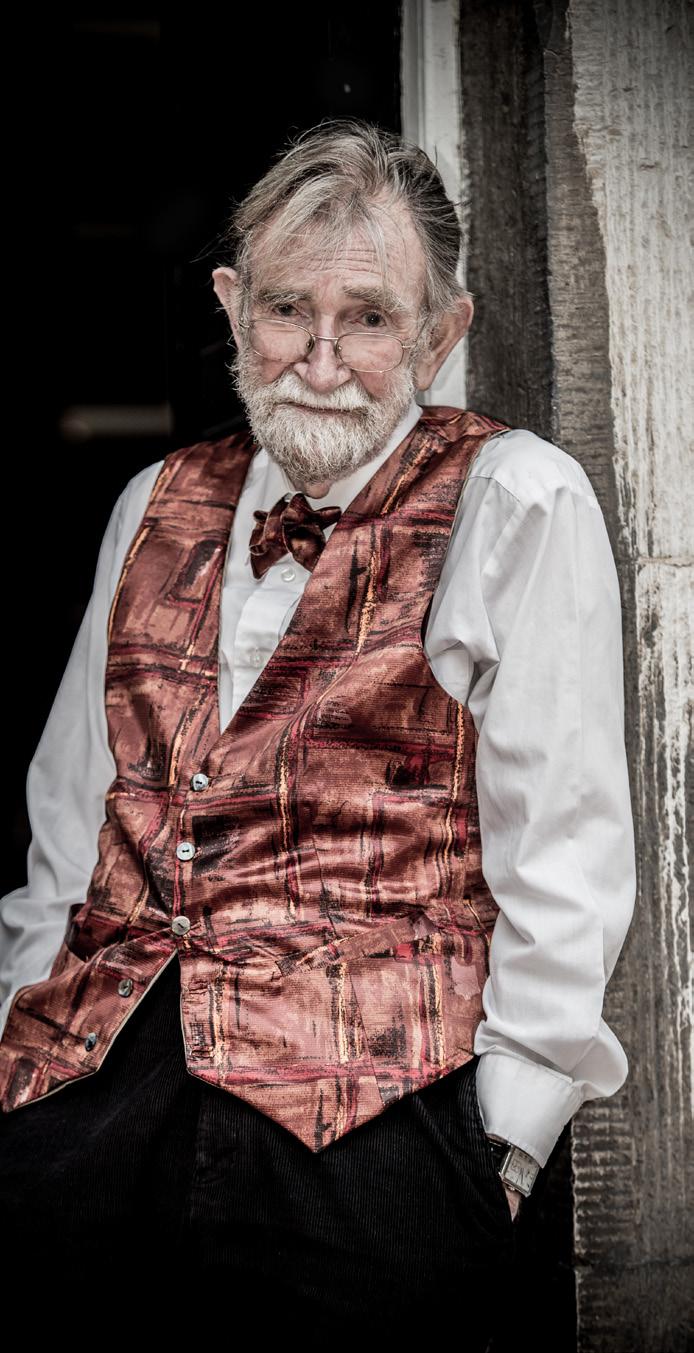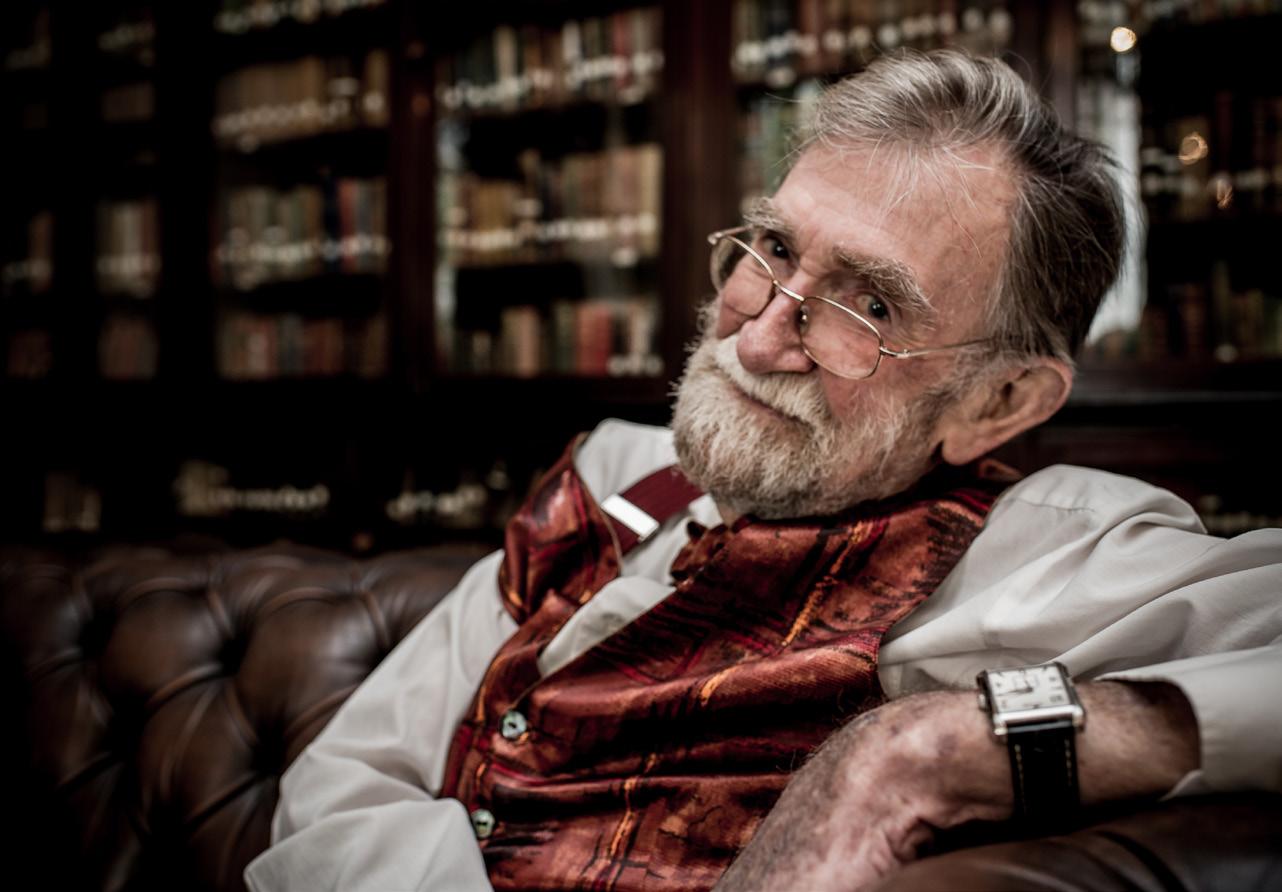
8 minute read
A Lifetime in Journalism: Peter Schirmer
In memory of our brilliant contributor and cherished friend, Peter Schirmer, we are re-publishing this interview from our November 2015 issue. We hope you enjoy reading it just as much the second time around. A LIFETIME
IN JOURNALISM

The Fleet Street of the 1960s was a beautiful era of hard metal typing and boozy lunches. Each newspaper had their own pub they would frequent, veteran journalist Peter Schirmer explains to me, as we take cover in a café on the Marina, away from the almost torrential storm brewing outside.
Peter, who has lived in Gibraltar for sixteen years, has the most incredible history of writing behind him. He cut his teeth at the Cape Times, fresh out of Cape Town University, where he studied English, Economics and Classical Culture. ‘The slackers course’, he tells me. During his time at the daily, he took on the role of a young political correspondent, reporting on parliamentary goings on during the early stages of apartheid. Soon after, the buzz of Fleet Street beckoned and he took up a position with the News Chronicle, a former UK daily that ceased publication in 1960. Soon after, the extremely liberal paper was absorbed by the Daily Mail, and four hundred journalists were left without work. Peter explains that after a stint acting as temporary editor for a month in Glasgow, at a small town paper, he applied for an economics correspondent’s role at ‘The Scotsman’, which also circulated around the UK. Still on Fleet Street, he did some freelance work with The Guardian’s sister Sunday paper, The Observer, which once took him to Wales to cover a story about miners who were pumping gas, found in their now closed mine, into their homes.
Headhunted by The Times
Staff of The Times to become the daily’s first Economics Correspondent. As part of a long standing tradition for The Times, Peter would have tea with then Governor of the Bank of England Lord Cromer, just opposite to their London Bridge Headquarters. This would always give him an insight into the week’s financial forecast, allowing Schirmer to make his predictions. In the early 60s, the Bank was still a wholly national institution. Despite his penchant for economics, Peter much preferred general news reporting. Whilst at the Times, Schirmer found himself acting temporarily as editor of the city pages, whilst full time Editor, Bill Clark and his number two were away. He chuckles as he opens up about a faux pas he made in letting a young Australian journalist take his place at an afternoon tea meeting with Lord Cromer. After refusing to take the office top hat off and mildly offending Lord Cramer with his post boozy lunch behavior, the boy was kicked out of the Bank and Peter was in dire trouble with the paper’s editor, William Haley. After a very short stint of being unemployed,

Peter was brought back, but soon moved to Kenya to take up a new role with The Times, as a parttime Africa correspondent.
Peter is full of fascinating tales from his vast array of journalistic roles, and the incredible moments in history that he covered throughout his lengthy career. One story that is most prominent to him is the attempted assassination of former South African Prime Minister Hendrik Verwoerd at the Rand Easter Show in Johannesburg in 1960. He also tells me that during his time in Argentina, he interviewed Horst Eichmann, Nazi war criminal Adolf Eichmann’s son, who at the time headed his own neo-Nazi organisation in Argentina.
Much of his time was occupied in Africa, particularly in the South, an area of the world he desperately loved, having been born there. As he fills me in on his life, which takes two large cups of tea to fully get through, he notes the funny coincidence that his last interview with a journalist like myself was carried out fifty years ago, around the time that the Argentinian national rugby team formed to play against South Africa. This time around, our interview comes a day after the Argentinians play a World Cup match against Ireland.
Travelling to Kenya, Peter met his wife Jill, a stewardess with East Africa Airlines. He describes 1963 as ‘the most amazing year of [his] life’ during Kenya’s era of independence. These years were filled with inebriation and hearty drunkenness, leading to a particularly hilarious incident that saw him mistakenly squat in the wrong house for a week, when he was asked to house sit for primatologist Jane Goodall and her husband Hugo. It was only when he sparked up a conversation with a friend about the lemon tree in the front garden that he realised his mistake. Peter and Jill soon decided moved their lives to South America.
From Journalism to Publishing
Their first daughter was born in Buenos Aires during a time that saw Peter heavily involved with the Argentinian Rugby Union as he freelanced for publications in South Africa, Australia and the UK’s Daily Express. Bouncing back and forth to South Africa every so often, Peter fell out of journalism for some time, instead editing
Reader’s Digest books, a job he found particularly fascinating. Due to a rise in television game shows, the readership dropped significantly. Much of the profits made on Reader’s Digest books were through the offers of competition and winning prizes. His time away from the news also saw him briefly document the topsecret process of building military hardware. Peter tells me he could only take so much of this before he commenced work with South African publishing giant Random House Struik where he edited a South African encyclopedia and, he tells me, a travel book about South Africa that was to be translated into German. He admits that he enjoyed this process hugely, often sneaking his own made up words into publications, weaving between editing books and magazines and falling back into news reporting, the Schirmers found themselves growing tired of having stayed in one place for so long. Both daughters were studying and the opportunity to up and escape to another unfamiliar corner of the world arose. Peter and Jill set their sights on Greece, specifically Spili,
in Crete. They fell deeply in love with the Mediterranean island life, particularly after coming across the perfect mountainside cottage to call their own. Peter explains to me that the door-less, sea-facing outhouse is what ultimately drew him to the property.
Crete, Salisbury and Gibraltar
Peter and Jill transitioned seamlessly into their quaint Cretan life, teaching English whilst they searched for a restaurant to start up. Peter also used this time to pen his first novel, an adult fairytale featuring leprechauns and similar South African mythological creatures, tokoloshes. The story followed a theme of racial relations, with both having to learn to co-exist together. The book was never picked up by a publisher. They eventually bought a restaurant that had a few years of immense success, before picking up the 28ft boat they’d purchased before leaving South Africa, and sailing to Gibraltar where they sold her and continued their life in Crete.
When news broke that Jill’s mothers had fallen ill, the Schirmer’s sold the restaurant and reluctantly trundled back to the UK. Living in Salisbury, Peter returned to Reader’s Digest whilst Jill studied chiropractic. After growing tired of the dull British lifestyle they considered an appropriate location for Jill to be able to continue to practice. They settled on Gibraltar, buying a home in Marina Court, Peter used his old Fleet Street contacts to string from the UK. He contacted the Gibraltar Chronicle to ensure that his freelance writing wouldn’t be stepping within their territory. It was then that former editor, Dominique Searle, asked Peter to write a financial column for the paper. Having been reluctantly dragged back into the world of finance, Peter further contributed frequent pieces to The Gibraltar Magazine, the Chamber of Commerce magazine B2B and Gibraltar International. From there, he was approached by former GSD Trade and Tourism minister Joe Holliday to assist with the independently run daily, Vox. Vox was a welcome voice for many on the Rock. Peter tells me that for whatever reason, the Government of the time withdrew all their advertising from the paper and it moved online. He continues to write for the Chronicle, covering a number of high profile court cases including the Marrache and Ken Robinson trials.
We briefly discuss the move of the news from print to online and Peter points his two crooked index fingers at me, ‘that’s from all the years of hard metal typing’, he says. He’s a complete Luddite when it comes to social media, shrugging off Facebook and Twitter. He tells me about the lengthy process of research that journalists had to go through before the internet came about. Hours spent pouring over encyclopedias and the seventeen volumes of the Oxford English Dictionary.
Having been away from Spili for nineteen years, the Schirmer’s returned recently, during a holiday. ‘It was incredibly emotional,’ Peter insists. The trip brought up a yearn to rewrite the ‘great Cretan book’ he’d always had in his head, ‘No Problem Petrus’. The story follows life in Spili and the process of completely overhauling their beautiful mountain cottage. Falling swiftly back into Mediterranean life, Peter and Jill purchased a cottage on their own hill in Cortes de la Frontera. Each week, once Thursday rolls around, the couple escapes into the mountains to soak up the lifestyle they learnt to love in their favourite little Cretan village.











